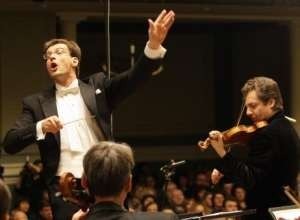FIRST JUBILEE OF KAUNAS SYMPHONY ORCHESTRA 0
Vaiva Mažulytė
www.kamane.lt , 2010 02 08
Fragment of a photo by T.Ragina (kaunodiena.lt)
In brief: It is likely that Kaunas Symphony Orchestra, which is celebrating its jubilee of five years, has a large crowd of admirers already. There were no free seats at least on the first evening of the birthday festival organised at Kaunas Philharmonic Hall on the 5th and 6th of February.
Like every important jubilee, the jubilee of the orchestra was honoured by respectable guests, congratulations and awards. Kaunas mayor Andrius Kupčinskas granted jubilee statues to the first orchestra conductor Pavel Berman, the present principal conductor Modestas Pitrėnas, head of the orchestra Algimantas Treikauskas, guest of the concert from Riga, composer and pianist Raimonds Pauls. The concertmasters of separate orchestra instrument groups were honoured.
The festival that started rather bombastically presented a possibility to hear impressive musical compositions later. Remembering the first concert of Kaunas Symphony Orchestra in 2005, the overture of Giedrius Kuprevičius “Birth of the Orchestra" created for the founded orchestra on purpose was performed. The composition full of surprises enabled to look from the perspective of time: five years - is it much or little?
Later listeners could evaluate the mastery of the orchestra and enjoy the return of the first conductor of Kaunas Symphony Orchestra. P.Berman returned with a violin rather than a baton in his hands to perform the concert for violin and orchestra No. 2 in g minor, op 63 by S. Prokofjev.
The technically complicated work demanded much concentration from musicians. At the beginning the orchestra lacked self-confidence and precise knowing what they did. Still, later they felt the strict and strong hand of M.Pitrėnas and ended the work in a more secure manner. The audience could enjoy the irreproachable technique of the soloist P.Berman and the wonderful sound of the violin. However, the soloist and the orchestra musicians could establish a deeper musical relation in the concert.
The number of performers increased markedly in the second part of the concert. Kaunas State Choir (art director and principal conductor Petras Bingelis) appeared on the stage along with the orchestra. These two big ensembles performed well-known musical compositions played on important occasions: A.Borodin's “Polovian Dances“ from the opera “Knight Igor“ and the work of H. Villa-Lobos Choros No. 10, whichis not heard so frequently.
“Polovian Dances” sounded freely and assuredly. The work of H.Villa-Lobos was equally effective but it demanded more efforts from the musicians. It was extremely interesting and suited both collectives. One would like to hope that such unheard and interesting opuses will be included into the repertoire later too.
The work of two famous Latvian composers Raimunds Pauls and Artur Maskat, fantasy for the fortepiano, orchestra and mixed choir “Theatre” was chosen for the end of the concert. Being a famous composer and pianist, R. Pauls performed the composition created by him by the piano.
The fantasy “Theatre” stood out from other music pieces of the concert by lyrical melodies and improvisation typical of jazz. Both composers looked at the word "theatre" from another angle. The fantasy was not theatrical or dramatic. R.Pauls known in the world as a creator of popular music made this opus closer to pop style.
After the fantasy, R.Pauls had to return to the stage several times: he performed improvisations on themes of popular songs created by him "Million Red Roses” ("Milijon, milijon alych roz..." in Russian) and others.
"Tango” by A.Maskat sounded instead of the fantasy "Theatre" on the second day of the jubilee concerts. The characteristic and charming music piece for the orchestra was performed with inspiration and nostalgic mood typical of tango genre.
Kaunas Symphony Orchestra, which prepared a complicated programme of a rather wide spectrum along with the conductor M.Pitrėnas, is worth the applause. The orchestra which has many strong musicians could present complicated and interesting programmes constantly. The orchestra should trust its power more, should work and have more patience and inspiration.

